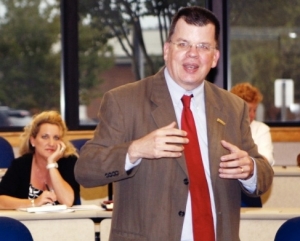Golden LEAF to look over projects
By Steve Herring
Published in News on May 23, 2012 1:46 PM

News-Argus/STEVE HERRING
Golden LEAF Foundation President Dan Gerlach addresses a Tuesday night meeting of local residents who are heading up the county's efforts to identify projects to qualify for the foundation's Community Assistance Initiative. The county will receive $2 million through the grant program.
Wayne County is assured of funding through the Golden LEAF Foundation's Community Assistance Initiative, but first the group steering the process faces the daunting task of narrowing $18.5 million in potential projects to fit the grant's $2 million cap.
Meeting for the fourth time in as many months Tuesday night at Wayne Community College, the group came up with multiple projects in the areas of education and work force development; economic development and infrastructure; and youth services.
Some of the ideas include a retail restaurant incubator, downtown business incubator, Waynesborough Park, water park/teen center, centralized tech prep high school, STEM labs and a program for literacy, technology skills and work ethics.
The grant program targets the state's economically distressed counties.
Golden LEAF funds come from the tobacco buyout and settlement reached several years ago between the government and the tobacco companies. A portion of the money paid out by the companies was set aside to boost economic development and quality of life in the state. The foundation was created to distribute the money.
No projects have been finalized, but the foundation will begin sending out requests today for proposal draft forms.
People interested in seeking funding have until June 21 to complete and return the form to the Golden LEAF Foundation. The general public may submit ideas as well, said Pat Cabe, foundation vice president of programs/community assistance and outreach.
The information on the form will include a project name, the applicant's name, how much money is being sought and the project's goals.
While several groups can partner to submit an application, only one name will be listed on the form, Ms. Cabe said.
Partnerships can work well, or not, she said. However, she counseled caution since the foundation would hold the applicant of record accountable for the grant and project, even though others might be involved.
Also, if governmental entity files, it needs to ensure that its house is in order, she said. The foundation will scrutinize the unit's finances.
Once the requests for proposal forms are completed, foundation officials will read and review them in advance of the group's next meeting June 26.
At that meeting, foundation officials will review the proposals with the group and provide feedback, she said.
Then, the three breakout groups will each nominate three of its members and one alternate to comprise a nine-member local review team.
The team will be charged with reviewing the proposals and narrowing the list in priority order.
The members will be required to sign conflict of interest forms and will not be allowed to vote for their own projects.
The list will be submitted to the foundation board, which will make the final decision.
"We are looking for projects that do the most good for the most people," Ms. Cabe said. "This is a one-shot deal. Come in a little over $2 million. Something may be cut and you cannot bring in other projects after that happens."
Also important is offering projects that have consensus support and detailing how a project will be sustained after the grant funds are exhausted, she said.
For more information contact Ms. Cabe or Calvin Allen by e-mail at [email protected] or [email protected] or by calling 888-684-8404.
